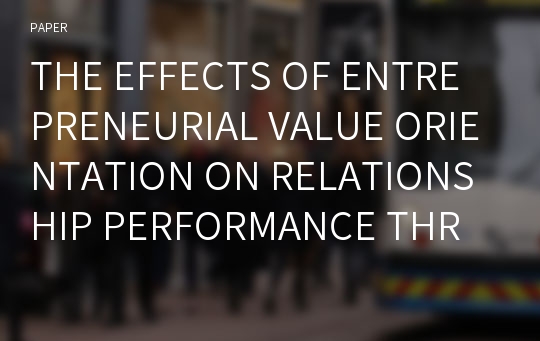THE EFFECTS OF ENTREPRENEURIAL VALUE ORIENTATION ON RELATIONSHIP PERFORMANCE THROUGH VALUE CO-CREATION IN B2B INDUSTRY
* 본 문서는 배포용으로 복사 및 편집이 불가합니다.
서지정보
ㆍ발행기관 : 글로벌지식마케팅경영학회(GFMC)
ㆍ수록지정보 : Global Marketing Conference
ㆍ저자명 : Kyong Ryul Koo, Kyung Hoon Kim, Nam Hee Jin
ㆍ저자명 : Kyong Ryul Koo, Kyung Hoon Kim, Nam Hee Jin
한국어 초록
43 5. Research Model Value Co-Creation Customer ParticipationㆍInformation seeking ㆍInformation sharing ㆍResponsible behavior ㆍPersonal interactionCustomer Citizenship ㆍFeedbackㆍAdvocacyㆍHelpingㆍToleranceRelationship PerformanceㆍTrust ㆍCommitment ㆍLoyaltyEntrepreneurial Value OrientationEntrepreneurial Orientation(EO)Relationship Orientation(RO)MarketOrientation(MO)H1H2H3H4H5H6H7H8 Hypotheses H1: Entrepreneurial Orientation will have a positive influence on customer participation behavior in value co-creation process H2: Market Orientation will have a positive influence on customer participation behavior in value co-creation process H3: Relationship Orientation will have a positive influence on customer participation behavior in value co-creation process H4: Entrepreneurial Orientation will have a positive influence on customer citizenship behavior in value co-creation process H5: Market Orientation will have a positive influence on customer citizenship behavior in value co-creation process H6: Relationship Orientation will have a positive influence on customer citizenship behavior in value co-creation process H7: Customer participation behavior in value co-creation process will have a positive influence on relationship performance H8: Customer citizenship behavior in value co-creation process will have a positive influence on relationship performance43 5. Research Model Value Co-Creation Customer ParticipationㆍInformation seeking ㆍInformation sharing ㆍResponsible behavior ㆍPersonal interactionCustomer Citizenship ㆍFeedbackㆍAdvocacyㆍHelpingㆍToleranceRelationship PerformanceㆍTrust ㆍCommitment ㆍLoyaltyEntrepreneurial Value OrientationEntrepreneurial Orientation(EO)Relationship Orientation(RO)MarketOrientation(MO)H1H2H3H4H5H6H7H8 Hypotheses H1: Entrepreneurial Orientation will have a positive influence on customer participation behavior in value co-creation process H2: Market Orientation will have a positive influence on customer participation behavior in value co-creation process H3: Relationship Orientation will have a positive influence on customer participation behavior in value co-creation process H4: Entrepreneurial Orientation will have a positive influence on customer citizenship behavior in value co-creation process H5: Market Orientation will have a positive influence on customer citizenship behavior in value co-creation process H6: Relationship Orientation will have a positive influence on customer citizenship behavior in value co-creation process H7: Customer participation behavior in value co-creation process will have a positive influence on relationship performance H8: Customer citizenship behavior in value co-creation process will have a positive influence on relationship performance43 5. Research Model Value Co-Creation Customer ParticipationㆍInformation seeking ㆍInformation sharing ㆍResponsible behavior ㆍPersonal interactionCustomer Citizenship ㆍFeedbackㆍAdvocacyㆍHelpingㆍToleranceRelationship PerformanceㆍTrust ㆍCommitment ㆍLoyaltyEntrepreneurial Value OrientationEntrepreneurial Orientation(EO)Relationship Orientation(RO)MarketOrientation(MO)H1H2H3H4H5H6H7H8 Hypotheses H1: Entrepreneurial Orientation will have a positive influence on customer participation behavior in value co-creation process H2: Market Orientation will have a positive influence on customer participation behavior in value co-creation process H3: Relationship Orientation will have a positive influence on customer participation behavior in value co-creation process H4: Entrepreneurial Orientation will have a positive influence on customer citizenship behavior in value co-creation process H5: Market Orientation will have a positive influence on customer citizenship behavior in value co-creation process H6: Relationship Orientation will have a positive influence on customer citizenship behavior in value co-creation process H7: Customer participation behavior in value co-creation process will have a positive influence on relationship performance H8: Customer citizenship behavior in value co-creation process will have a positive influence on relationship performance43 5. Research Model Value Co-Creation Customer ParticipationㆍInformation seeking ㆍInformation sharing ㆍResponsible behavior ㆍPersonal interactionCustomer Citizenship ㆍFeedbackㆍAdvocacyㆍHelpingㆍToleranceRelationship PerformanceㆍTrust ㆍCommitment ㆍLoyaltyEntrepreneurial Value OrientationEntrepreneurial Orientation(EO)Relationship Orientation(RO)MarketOrientation(MO)H1H2H3H4H5H6H7H8 Hypotheses H1: Entrepreneurial Orientation will have a positive influence on customer participation behavior in value co-creation process H2: Market Orientation will have a positive influence on customer participation behavior in value co-creation process H3: Relationship Orientation will have a positive influence on customer participation behavior in value co-creation process H4: Entrepreneurial Orientation will have a positive influence on customer citizenship behavior in value co-creation process H5: Market Orientation will have a positive influence on customer citizenship behavior in value co-creation process H6: Relationship Orientation will have a positive influence on customer citizenship behavior in value co-creation process H7: Customer participation behavior in value co-creation process will have a positive influence on relationship performance H8: Customer citizenship behavior in value co-creation process will have a positive influence on relationship performanceand relationship performance. 2. Conceptual framework 2.1 Entrepreneurial Value Orientation Entrepreneurial Orientation Entrepreneurial-oriented firms with risk-taking, proactivness, and innovativeness focus on finding new market opportunities and reshaping current operating areas (Hult and Ketchen 2001). Entrepreneurial orientation provides firms with first-mover advantages and has a positive effect on performance. Entrepreneurs create value through innovation with exploiting new opportunity and creating new product-market areas. Market Orientation Market-oriented firms create superior value through the understanding of customers’ needs and the capabilities to fulfill those identified needs (Jaworski & Kohli, 1993). The value creation of market-oriented firms is based on strong commitment to developing product innovation capabilities (Atuahen-Gima, 1996). Market orientation provides firms with market-linking capabilities that help create and deliver value to customers (O’Cass and Ngo, 2012). Relationship Orientation Interaction orientation An interaction orientation is regarded as a sustainable competitive advantage and a value rare and as a value creation driver. Interaction oriented firms with specific and actionable nature are characterized by analyzing individual customer, not a market, performing marketing activities with customers, not for customers, by emphasizing the importance of the relationship to firms (Ramini and Kumar, 2008). The relational performance of interaction orientation is measured by customer satisfaction, customer ownership, and positive word of mouth (Ramini and Kumar, 2008). Long-term orientation Long-term orientation also creates a sustainable competitive advantage through information on best-selling product, best allowable price, cooperative advertizing, etc (Ganesan 1994). Firms with short-term orientation focus on market exchange for profit in a transaction, but firms with long-term orientation focus on relational exchange for profit from joint synergies over a series of transactions, not the length of the relationships (Ganesan 1994). Relational elements like long-term orientation increases mutual commitment to enhance mutual profitability in buyer-seller relationships (Noordewier et al 1990). 2.2 Value co-creation The customers co-create value based on their roles as participants or co-creators in various value-creating processes (Vargo and Lusch 2008a). Joint value is created among customer, suppliers, competitors, and other stakeholders involved in the relationship (Gummesson 1999). The various approaches to value co-creation have discussed. A unified value co-creation concept is explained by three types of processes such as customer value-creating processes, supplier value-creating process, and encounter processes (Payne et al., 2008). Value co-creation behaviors consist of customer participation behavior and customer citizenship behavior. Customer participation behavior that they conceptualizedand relationship performance. 2. Conceptual framework 2.1 Entrepreneurial Value Orientation Entrepreneurial Orientation Entrepreneurial-oriented firms with risk-taking, proactivness, and innovativeness focus on finding new market opportunities and reshaping current operating areas (Hult and Ketchen 2001). Entrepreneurial orientation provides firms with first-mover advantages and has a positive effect on performance. Entrepreneurs create value through innovation with exploiting new opportunity and creating new product-market areas. Market Orientation Market-oriented firms create superior value through the understanding of customers’ needs and the capabilities to fulfill those identified needs (Jaworski & Kohli, 1993). The value creation of market-oriented firms is based on strong commitment to developing product innovation capabilities (Atuahen-Gima, 1996). Market orientation provides firms with market-linking capabilities that help create and deliver value to customers (O’Cass and Ngo, 2012). Relationship Orientation Interaction orientation An interaction orientation is regarded as a sustainable competitive advantage and a value rare and as a value creation driver. Interaction oriented firms with specific and actionable nature are characterized by analyzing individual customer, not a market, performing marketing activities with customers, not for customers, by emphasizing the importance of the relationship to firms (Ramini and Kumar, 2008). The relational performance of interaction orientation is measured by customer satisfaction, customer ownership, and positive word of mouth (Ramini and Kumar, 2008). Long-term orientation Long-term orientation also creates a sustainable competitive advantage through information on best-selling product, best allowable price, cooperative advertizing, etc (Ganesan 1994). Firms with short-term orientation focus on market exchange for profit in a transaction, but firms with long-term orientation focus on relational exchange for profit from joint synergies over a series of transactions, not the length of the relationships (Ganesan 1994). Relational elements like long-term orientation increases mutual commitment to enhance mutual profitability in buyer-seller relationships (Noordewier et al 1990). 2.2 Value co-creation The customers co-create value based on their roles as participants or co-creators in various value-creating processes (Vargo and Lusch 2008a). Joint value is created among customer, suppliers, competitors, and other stakeholders involved in the relationship (Gummesson 1999). The various approaches to value co-creation have discussed. A unified value co-creation concept is explained by three types of processes such as customer value-creating processes, supplier value-creating process, and encounter processes (Payne et al., 2008). Value co-creation behaviors consist of customer participation behavior and customer citizenship behavior. Customer participation behavior that they conceptualizedcomprises four dimensions including information seeking, information sharing, responsible behavior, and personal interaction. Customer citizenship behaviors include feedback, advocacy, helping, and tolerance (Yi, and Gong 2013). 2.3 Relationship performance Ulaga(2003) proposed to identify the linkage between relationship value and relationship variables including commitment, trust, satisfaction, and loyalty. The authors consider trust, commitment, and loyalty as measurement items of relationship performance. Trust is measured as a dependent variable in channel relationships. Commitment is a good indicator of long-term relationships (Morgan and Hunt, 1994) and has been used as the dependent variable in several relationship marketing models including buyer-seller relationship (kumar et al., 1995). Consumer loyalty is related to a motivation to maintain a relationship with a firm, including more resources, positive word of mouth (WOM), and repeat purchasing (Zeithaml, Berry, and Parasuraman 1996). Value drives loyalty and trust affects loyalty through its influence in creating value (Sirdeshmukh, Singh and Sabol 2002) 3. Plan for Data Collection and analysis The instrument used to test the hypotheses a mail survey. A draft questionnaire based on existing measurement scales for the research model will be drafted. This draft questionnaire will be pretested with academics and practitioners to check its content validity and terminology and modified accordingly. The modified questionnaire will be pilot tested to check its suitability and appropriateness for the target population before mailing. The sample population for this study will be business-to-business manufacturing firms in South Korea. The authors will undertake both confirmatory factor analysis and structural equation modeling to test our hypotheses using the SPSS 20 and AMOS 20. 4. Expected outcomes and contribution 4.1 Expected outcomes The analysis will identify whether or not the positive influence of entrepreneurial value orientation has on value co-creation including customer participation behavior and customer citizenship behavior. The relationship between the value co-creation and relationship performances will be identified. The more actively customers engage in the value co-creation process, the greater trust, commitment, and loyalty could be positively influenced. Value co-creation plays an important role in increasing relationship performance and could be regarded as a source of sustainable competitive advantage. 4.2 Contribution This study will be the first effort to identify between the relationship between value co-creation and relationship performance. This research will be the first empirical study to apply the concept of value co-creation to business-to-business firms. In terms of marketing academics, this study will contribute to broaden marketing research areas. Managers of business-to-business firms from the results of this study will recognize valuable information on how the extent of an individual’s orientations such as entrepreneurial orientation, market orientation, and relationship orientation affects value co-creation.comprises four dimensions including information seeking, information sharing, responsible behavior, and personal interaction. Customer citizenship behaviors include feedback, advocacy, helping, and tolerance (Yi, and Gong 2013). 2.3 Relationship performance Ulaga(2003) proposed to identify the linkage between relationship value and relationship variables including commitment, trust, satisfaction, and loyalty. The authors consider trust, commitment, and loyalty as measurement items of relationship performance. Trust is measured as a dependent variable in channel relationships. Commitment is a good indicator of long-term relationships (Morgan and Hunt, 1994) and has been used as the dependent variable in several relationship marketing models including buyer-seller relationship (kumar et al., 1995). Consumer loyalty is related to a motivation to maintain a relationship with a firm, including more resources, positive word of mouth (WOM), and repeat purchasing (Zeithaml, Berry, and Parasuraman 1996). Value drives loyalty and trust affects loyalty through its influence in creating value (Sirdeshmukh, Singh and Sabol 2002) 3. Plan for Data Collection and analysis The instrument used to test the hypotheses a mail survey. A draft questionnaire based on existing measurement scales for the research model will be drafted. This draft questionnaire will be pretested with academics and practitioners to check its content validity and terminology and modified accordingly. The modified questionnaire will be pilot tested to check its suitability and appropriateness for the target population before mailing. The sample population for this study will be business-to-business manufacturing firms in South Korea. The authors will undertake both confirmatory factor analysis and structural equation modeling to test our hypotheses using the SPSS 20 and AMOS 20. 4. Expected outcomes and contribution 4.1 Expected outcomes The analysis will identify whether or not the positive influence of entrepreneurial value orientation has on value co-creation including customer participation behavior and customer citizenship behavior. The relationship between the value co-creation and relationship performances will be identified. The more actively customers engage in the value co-creation process, the greater trust, commitment, and loyalty could be positively influenced. Value co-creation plays an important role in increasing relationship performance and could be regarded as a source of sustainable competitive advantage. 4.2 Contribution This study will be the first effort to identify between the relationship between value co-creation and relationship performance. This research will be the first empirical study to apply the concept of value co-creation to business-to-business firms. In terms of marketing academics, this study will contribute to broaden marketing research areas. Managers of business-to-business firms from the results of this study will recognize valuable information on how the extent of an individual’s orientations such as entrepreneurial orientation, market orientation, and relationship orientation affects value co-creation.43 5. Research Model Value Co-Creation Customer ParticipationㆍInformation seeking ㆍInformation sharing ㆍResponsible behavior ㆍPersonal interactionCustomer Citizenship ㆍFeedbackㆍAdvocacyㆍHelpingㆍToleranceRelationship PerformanceㆍTrust ㆍCommitment ㆍLoyaltyEntrepreneurial Value OrientationEntrepreneurial Orientation(EO)Relationship Orientation(RO)MarketOrientation(MO)H1H2H3H4H5H6H7H8 Hypotheses H1: Entrepreneurial Orientation will have a positive influence on customer participation behavior in value co-creation process H2: Market Orientation will have a positive influence on customer participation behavior in value co-creation process H3: Relationship Orientation will have a positive influence on customer participation behavior in value co-creation process H4: Entrepreneurial Orientation will have a positive influence on customer citizenship behavior in value co-creation process H5: Market Orientation will have a positive influence on customer citizenship behavior in value co-creation process H6: Relationship Orientation will have a positive influence on customer citizenship behavior in value co-creation process H7: Customer participation behavior in value co-creation process will have a positive influence on relationship performance H8: Customer citizenship behavior in value co-creation process will have a positive influence on relationship performance참고 자료
없음태그
"Global Marketing Conference"의 다른 논문
 THE ROLES OF GREEN PACKAGING IN UGLY FOOD PURCHASE INTE..22페이지
THE ROLES OF GREEN PACKAGING IN UGLY FOOD PURCHASE INTE..22페이지 THE IMPACT OF INDUCED AWE ON ETHICAL TOURIST BEHAVIORS5페이지
THE IMPACT OF INDUCED AWE ON ETHICAL TOURIST BEHAVIORS5페이지 A BIBLIOMETRIC ANALYSIS OF SPIRITUAL TOURISM RESEARCH15페이지
A BIBLIOMETRIC ANALYSIS OF SPIRITUAL TOURISM RESEARCH15페이지 SOCIAL NETWORK ANALYSIS AND RESPONSE TIME TESTING: CONS..11페이지
SOCIAL NETWORK ANALYSIS AND RESPONSE TIME TESTING: CONS..11페이지 THE EFFECTS OF PARA-SOCIAL INTERACTION ON ONLINE CELEBR..3페이지
THE EFFECTS OF PARA-SOCIAL INTERACTION ON ONLINE CELEBR..3페이지 THE INFLUENCE OF OPINION LEADERS ON DAILY DEALS USER’S ..3페이지
THE INFLUENCE OF OPINION LEADERS ON DAILY DEALS USER’S ..3페이지 HOW IMMERSIVE RETAILING AFFECTS CONSUMERS’ URGE TO BUY:..6페이지
HOW IMMERSIVE RETAILING AFFECTS CONSUMERS’ URGE TO BUY:..6페이지 KEY TO SUPERSTARDOM IN A GLOBALISED MARKET: THE ROLE OF..6페이지
KEY TO SUPERSTARDOM IN A GLOBALISED MARKET: THE ROLE OF..6페이지 A POST-PANDEMIC LOOK AT TOURISTS’ PERCEIVED COOLNESS OF..4페이지
A POST-PANDEMIC LOOK AT TOURISTS’ PERCEIVED COOLNESS OF..4페이지 EXTRACTING OFFLINE RETAIL SHOPPING PATTERNS: OLLABORATI..5페이지
EXTRACTING OFFLINE RETAIL SHOPPING PATTERNS: OLLABORATI..5페이지


























